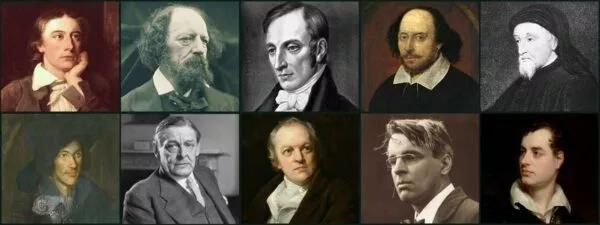English poetry has captured hearts and minds for centuries, reflecting the beauty, pain, and complexity of human existence. From the romanticism of nature to the despair of war, these timeless masterpieces have left an indelible mark on literature and culture. Below is a list of the top 10 most popular English poems, celebrated across generations.
1. “The Road Not Taken” by Robert Frost
Famous Lines:
“Two roads diverged in a wood, and I—
I took the one less traveled by,
And that has made all the difference.”
Why It’s Popular:
This reflective piece speaks to life’s choices and their lasting impact. Its simple yet profound metaphor resonates with readers worldwide.
2. “If—” by Rudyard Kipling
Famous Lines:
“If you can meet with Triumph and Disaster
And treat those two impostors just the same…”
Why It’s Popular:
A timeless guide to resilience, masculinity, and virtue, “If—” is often quoted as advice for strength and composure during hardship.
3. “Daffodils” by William Wordsworth
Famous Lines:
“I wandered lonely as a cloud
That floats on high o’er vales and hills…”
Why It’s Popular:
This romantic ode to nature captures the beauty of a simple moment and the joy it brings to the soul, even in memory.
4. “Ozymandias” by Percy Bysshe Shelley
Famous Lines:
“Look on my Works, ye Mighty, and despair!
Nothing beside remains…”
Why It’s Popular:
A powerful commentary on human pride and the fleeting nature of power, this sonnet remains relevant in any age.
5. “Shall I Compare Thee to a Summer’s Day?” by William Shakespeare
Famous Lines:
“Shall I compare thee to a summer’s day?
Thou art more lovely and more temperate…”
Why It’s Popular:
One of Shakespeare’s best-known sonnets, it is a romantic celebration of eternal beauty and poetic immortality.
6. “Do Not Go Gentle into That Good Night” by Dylan Thomas
Famous Lines:
“Do not go gentle into that good night,
Old age should burn and rave at close of day…”
Why It’s Popular:
This villanelle pleads for defiance against death, urging the reader to “rage against the dying of the light.”
7. “Stopping by Woods on a Snowy Evening” by Robert Frost
Famous Lines:
“The woods are lovely, dark and deep,
But I have promises to keep,
And miles to go before I sleep…”
Why It’s Popular:
Frost’s vivid imagery and contemplative tone capture the peaceful pull of nature, balanced by the responsibilities of life.
8. “Annabel Lee” by Edgar Allan Poe
Famous Lines:
“We loved with a love that was more than love—
I and my Annabel Lee…”
Why It’s Popular:
A haunting poem of eternal love and loss, Poe’s lyrical expression continues to move readers emotionally.
9. “Because I Could Not Stop for Death” by Emily Dickinson
Famous Lines:
“Because I could not stop for Death –
He kindly stopped for me –”
Why It’s Popular:
Dickinson’s philosophical take on mortality gives death a calm, even polite presence, challenging typical views on the end of life.
10. “How Do I Love Thee?” by Elizabeth Barrett Browning
Famous Lines:
“How do I love thee? Let me count the ways…”
Why It’s Popular:
An iconic love sonnet that has echoed through time, this poem expresses deep, spiritual affection that transcends life itself.
Conclusion:
These poems are not just literary works; they are emotional landmarks that continue to inspire, comfort, and provoke thought. Whether you are a seasoned poetry lover or a new explorer of verse, these ten masterpieces are essential to understanding the enduring power of English poetry.

